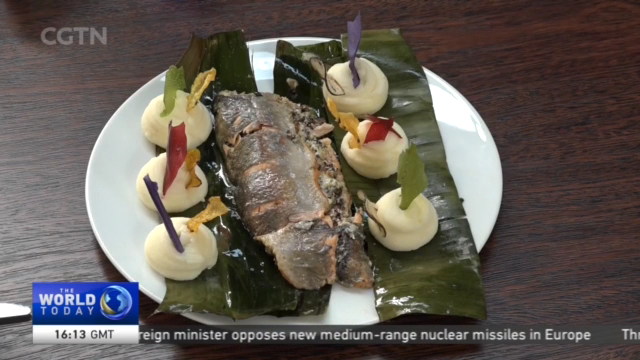
10:15, 28-Dec-2018
Gastronomic Boom: Modernizing Bolivian cuisine
Updated
10:02, 31-Dec-2018
04:29

Bolivia is going through a gastronomic boom of sorts, as it looks to modernize and globalize its cuisine without losing its identity. The land-locked Latin American country has some highly-distinctive offerings - unknown even to foodies - and is fast becoming a fixture on the culinary map. CGTN's Dan Collyns reports from La Paz.
All fired up and ready to go. Bolivian chefs are on a mission to dish up the best their country has to offer. Marcelo Saenz - head chef at La Paz's El Jardin de Asia is preparing a traditional dish with some Asian flair. In Bolivia, a Huatia is a traditional pit oven that cooks food underground. But Marcelo is using ground quinoa instead of actual soil to get the earthy flavors. In the dish served in this high-end restaurant which typically attracts Asian tourists.
SANDRA DORIA MEDINA OWNER, JARDIN DE ASIA "There's a movement of people who likes to travel to try different food and they just travel to find different tastes, here in La Paz it's beginning and we've seen that we find that we have to be united to make more people come and taste what we have."
In this bustling high-altitude city, there are now more options for hungry tourists looking to savor local flavors with gluten-free and vegan options, like Ali Pacha - which in native Aymara means a universe of plants and where 100 percent of what's on your plate, or in your glass, is Bolivian, says head chef and owner Sebastian Quiroga.
SEBASTIAN QUIROGA HEAD CHEF AND OWNER, ALI PACHA "We were always seeing other countries or other producers as having the best produce ever but I think that now we're accepting that we do have awesome produce and that we have to move a step forward in terms of opening our mind and see the possibilities to cook those products and experiment with the textures and flavors that you get- and that's what we do in this restaurant."
Quiroga says in the past, Bolivian food was eaten at home and top restaurants served Italian or French cuisine. But now, a homegrown gastronomic movement has sprung up - you could say organically.
DAN COLLYNS LA PAZ "It's often a sign of growing national pride and a more comfortable middle class when countries undergo a gastronomic boom. It's happened in Peru and now it's neighboring Bolivia's turn to take those native ingredients and dishes and give them a new twist for new palates."
But Bolivia's gastro-boom got a little push from award-winning restaurant Gustu which opened here five years ago. To everyone's astonishment, Gustu set out to redefine Bolivia's little known cuisine from its high plateau to its Amazon basin, as well as revamping unique products like Royal Quinoa - here in its white, red and black varieties.
PEPE ZAPATA CHEF, ONA "There was a big boom and quickly it swept along our food and our ingredients here. With God's blessing, there are more people involved in the production. It's much easier to get access to the farmers and we're lucky to be able to work directly with the people who bring us the produce, that's the best chef's school we could have."
So far, I had eaten delicious food but I could barely name a Bolivian dish until I joined these youngsters at chef school Manq'a and tried Chairo - a hearty soup made from lamb and potatoes. With nine schools in Bolivia, Manq'a helps poorer kids get a headstart with a five-month fast track course.
ANTONIO PIZARRO STUDENT CHEF "I would say this is really the career of the future, not just because there are now more restaurants but because human beings always need to eat and if your food is good, they will find you. That's why I'm learning here."
From here, it's straight into a kitchen in Bolivia's booming restaurant scene and the chance to cook the food they grew up eating for tourists and locals alike.
Dan Collyns, CGTN, La Paz.

SITEMAP
Copyright © 2018 CGTN. Beijing ICP prepared NO.16065310-3
Copyright © 2018 CGTN. Beijing ICP prepared NO.16065310-3